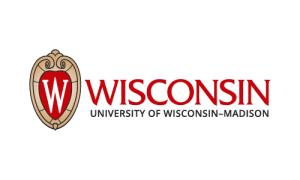University of Wisconsin-Madison graduates celebrate achievements, cultural legacies at spring commencement
The risk of a spring rain shower did little to dampen spirits at the Kohl Center Friday evening as about 800 doctoral, MFA and medical professional students received their degrees in front of a crowd of thousands of cheering loved ones.
Among the degree recipients was Hanna Barton, a doctoral graduate in industrial and systems engineering and the first member of their family to earn a PhD.
A native of McFarland, Barton is a Badger through and through. They previously received a bachelor’s and master’s degree from the University of Wisconsin–Madison’s College of Engineering and threw discus for the UW track and field team. Barton’s time at UW–Madison will continue after graduation as they begin a postdoctoral position in the School of Medicine and Public Health.
“I’ve had so many different phases of life on this campus,” said Barton, whose academic career began with engineering medical devices and has since shifted under the mentorship of their advisor, Nicole Werner, to studying healthcare system optimization for improved patient health.
Barton likes to joke that they pursued their PhD on “hard mode,” having started in spring 2020 just a couple months before COVID-19 upended just about every aspect of life on and off campus.
“What ultimately got me through is my advisor really trusted me and was interested in mentoring me for my own sake,” said Barton.
Friday’s commencement also marked a milestone for Chancellor Jennifer Mnookin, who wrapped up her first academic year at the helm of UW–Madison.
“There is something wonderful, and a bit daunting, about starting anew,” Mnookin told the graduates. “When you wake up tomorrow, you, too, will be starting anew. Getting ready to begin residency, or a postdoc, or your career, or a project that will take your work in a new direction.”
Happy Xiong is one graduate whose trajectory has already been shaped by taking on new challenges. A master of public health graduate and first-generation college student from Sheboygan, Xiong previously received a bachelor’s degree in biology from UW–Madison.
“It feels great to be here and to be able to celebrate in person,” said Xiong, whose undergraduate commencement ceremony was nixed by the pandemic.
Xiong worked for a year as a certified nursing assistant — during an immensely difficult period for healthcare workers — before he returned to UW to pursue a public health degree.
As a member of Wisconsin’s Hmong community, Xiong said he is drawn to a view of public health that emphasizes cultural relevance. His master’s degree work focused on connecting people to healthy food via food banks that provide fresh produce that they’re familiar with and know how to prepare. For instance, many Hmong don’t necessarily eat lettuce but would prefer bok choy, Xiong said.
“How do we make sure that everybody gets food that they actually want to eat and will use instead of tossing in the garbage,” said Xiong.
Xiong is set to continue his pursuit of culturally relevant healthcare in the fall when he’ll begin work on a medical degree from the School of Medicine and Public Health. Xiong plans to go into family medicine so he can guide patients toward healthy choices over the course of their lives.
Celebrating and honoring cultural identity was a theme Friday night as Ho-Chunk elder Cecil Garvin received an honorary doctorate degree. Garvin has devoted much of his professional life to the preservation and promotion of the Ho-Chunk language and culture.
Alternating between Ho-Chunk and English, Garvin shared a brief but resonant message with the graduates and their guests. As he spoke before the crowd, Garvin said his thoughts were with his ancestors and their stories and songs.
This cultural legacy, “that they have given us, in the future will not disappear. That is on my mind,” said Garvin as he received a standing ovation.
Watch Cecil Garvin receive honorary degree.
Chancellor Mnookin urged the new graduates to use their gifts and expertise to better the world, as Garvin has.
“You are graduating into a world that desperately needs a countervailing approach to belligerent and simplistic assertions of certainty,” she said. “If you can communicate about your area of expertise in a way that allows you to connect with people outside of your field, you will find yourself in an even better position to make a real difference in the world.”

